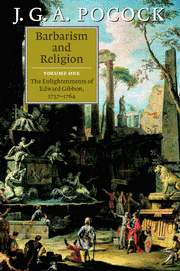Book contents
- Frontmatter
- Contents
- Acknowledgements
- Note on references, quotations and translations
- List of abbreviations
- Introduction
- PART I ENGLAND AND SWITZERLAND, 1737–1763
- PART II THE ENCOUNTER WITH PARIS AND THE DEFENCE OF ERUDITION, 1761–1763
- 6 The politics of scholarship in French and English Enlightenment
- 7 Erudition and Enlightenment in the Académie des Inscriptions
- 8 D'Alembert's Discours préliminaire: the philosophe perception of history
- 9 The Essai sur l'étude de la litterature: imagination, irony and history
- 10 Paris and the gens de lettres: experience and recollection
- PART III LAUSANNE AND ROME: THE JOURNEY TOWARDS A SUBJECT, 1763–1764
- Epilogue: Gibbon and the rhythm that was different
- List of references
- Index
7 - Erudition and Enlightenment in the Académie des Inscriptions
Published online by Cambridge University Press: 15 December 2009
- Frontmatter
- Contents
- Acknowledgements
- Note on references, quotations and translations
- List of abbreviations
- Introduction
- PART I ENGLAND AND SWITZERLAND, 1737–1763
- PART II THE ENCOUNTER WITH PARIS AND THE DEFENCE OF ERUDITION, 1761–1763
- 6 The politics of scholarship in French and English Enlightenment
- 7 Erudition and Enlightenment in the Académie des Inscriptions
- 8 D'Alembert's Discours préliminaire: the philosophe perception of history
- 9 The Essai sur l'étude de la litterature: imagination, irony and history
- 10 Paris and the gens de lettres: experience and recollection
- PART III LAUSANNE AND ROME: THE JOURNEY TOWARDS A SUBJECT, 1763–1764
- Epilogue: Gibbon and the rhythm that was different
- List of references
- Index
Summary
Gibbon embarked upon and completed the Essai sur l'étude de la littérature in the belief that erudition was under attack from d'Alembert; may we add ‘and those whom d'Alembert led and represented’? Neither the Essai nor the Memoirs is very specific in naming or defining such a group, and what the latter work has to say is better postponed until we consider Gibbon's visit to Paris after the Essai was published. We have, however, by now encountered the notion of a separation and perhaps an opposition between ‘erudition’ and ‘philosophy’, and the language of the Memoirs indicates that Gibbon had come to think that ‘a philosophic age’ was making light of the detailed textual scholarship he came to associate with the notion of history. If this was in his mind between 1758 and 1762, he may have seen d'Alembert's Discours préliminaire and the Encyclopédie it introduced as a vast philosophic offensive against values he set out to defend; but we should be cautious in ascribing to Gibbon our perception of the Encyclopédie as a grand event, complex but unified, in the history of the European mind. By the time the Memoirs were being written – Gibbon left them unfinished and unpublished – Burke (whose presence may be found in them) had characterised ‘the vast undertaking of the Encyclopedia’ as an event ‘not a little’ important in what he believed ‘these gentlemen’, the gens de lettres, aimed to carry out; Gibbon, however, referred to it simply as ‘their immense compilation’ and the Decline and Fall does not make much of it.
- Type
- Chapter
- Information
- Barbarism and Religion , pp. 152 - 168Publisher: Cambridge University PressPrint publication year: 1999



